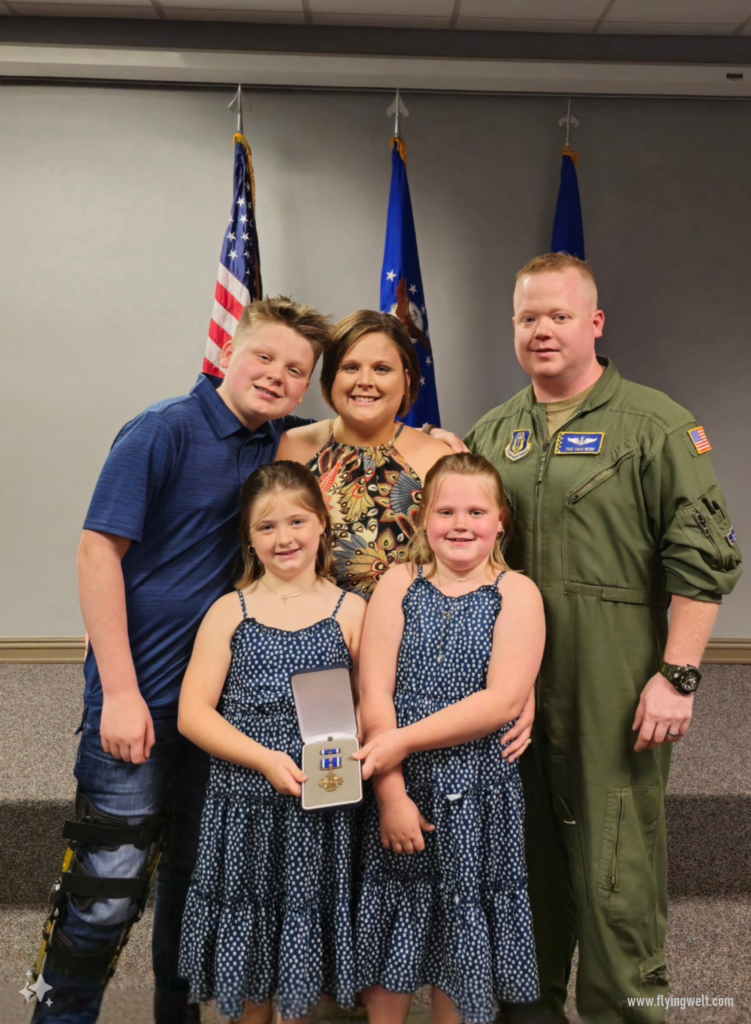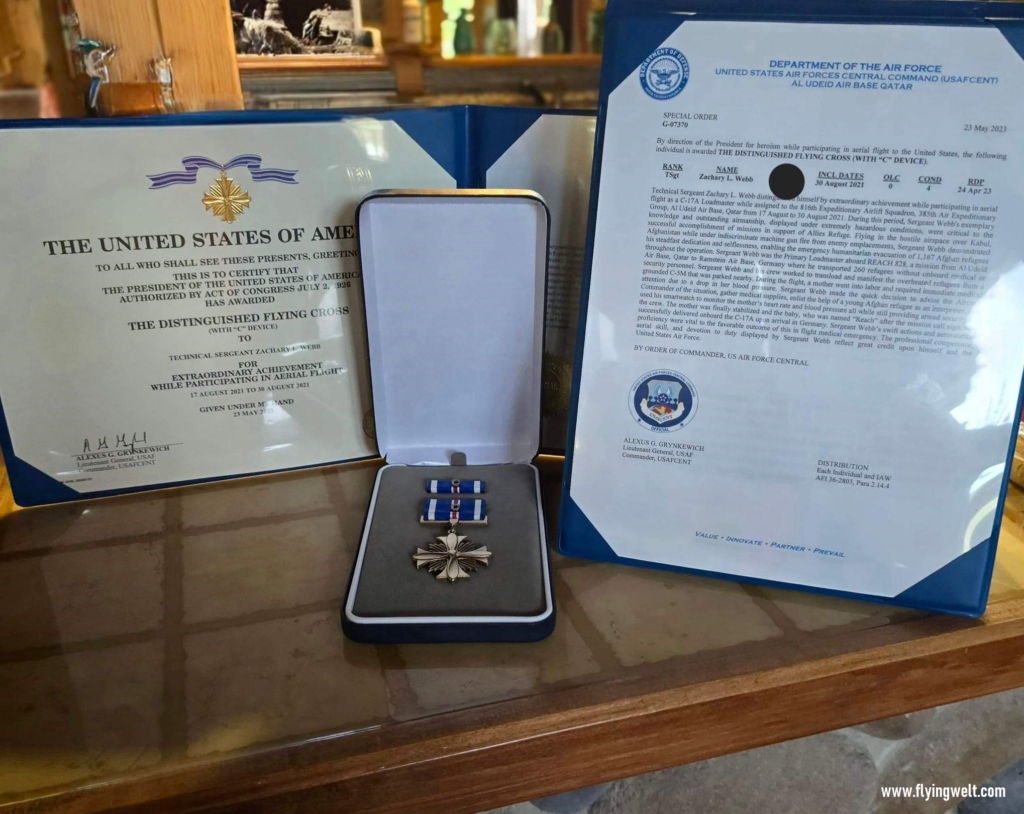In early June, Zach Webb stood onstage in the auditorium at Wright-Patterson Air Force Base, in Dayton, Ohio, fighting back something close to mortal terror. “It was a packed ceremony,” says the United States Air Force reservist, whose earthbound job is final test manager at GE Aerospace. “I had lots of family and friends there, plus all the upper leadership: the wing commander, the wing chief, and Major General [D. Scott] Durham, the 4th Air Force commander.” All were on hand to award Webb one of the Armed Forces’ highest honors, the Distinguished Flying Cross — if he could just survive the ceremony itself. “I’ll tell you what, when [the official] started off by reading the history of the Distinguished Flying Cross” — whose previous recipients include Charles Lindbergh, Chuck Yeager, John Glenn, Neil Armstrong, “plus a lot of World War II guys who had their airplanes shot out from underneath them,” Webb says — “I was sure I was gonna have a heart attack.”
All of which is a bit ironic, given the way Webb earned the Distinguished Flying Cross for heroism, which was awarded by President Joe Biden. As the Air Force citation reads, Technical Sergeant Zachary L. Webb “distinguished himself by extraordinary achievement while participating in aerial flight as a C-17A Loadmaster,” overseeing the human payload of aircraft flying high-risk missions to evacuate 1,167 Afghan refugees during the U.S. withdrawal from Afghanistan in 2021. His “exemplary knowledge and outstanding airmanship, displayed under extremely hazardous conditions, were critical to the successful accomplishment of missions in support of Allies Refuge,” for whose missions he flew “in the hostile airspace over Kabul, Afghanistan, while under indiscriminate machine gun fire from enemy emplacements.”
Knowing more of the details doesn’t make this sound any less scary.

The Flight of Reach 828, an Act of Heroism
On August 23, 2021, Webb was primary loadmaster aboard flight Reach 828, meaning he was responsible for everything loaded onto the aircraft. On this flight, it happened to include a woman in labor. Sometime after he and his crew hustled 260 overheated evacuees into their C-17 and lifted off from Qatar, he was buttonholed by an Afghan boy who, in broken English, conveyed that a female passenger was “having stomach pains.” When Webb attempted to examine the passenger, who was hunched over and covered head to toe in traditional garments, the boy clarified: “Baby come into world.” Webb realized that the woman was going to give birth somewhere over Türkiye, surrounded by hundreds of agitated passengers whose culture had strict standards of decorum between the sexes.
“It was pretty chaotic,” he says. Neither medical staff nor the Air Force “Ravens” security personnel were on board the flight. The most immediate threat he perceived was from other women, whose efforts to protect the pregnant woman’s modesty were suffocating her. “It was 120-plus degrees on the airplane, they were draping blankets over her, and I could see her gasping for air,” he recalls. Webb apprised the aircraft commander of the situation, gathered medical supplies, enlisted the help of his 12-year-old interpreter, and began using his smartwatch to monitor the mother’s sinking heart rate and blood pressure — all while providing armed security for the woman and the crew. “There were a lot of people trying to intervene, moving around the airplane, passing out from wounds,” he says. “Just a lot to control.”
At Webb’s urging, the pilots declared an emergency, and the plane descended to 28,000 feet for the richer oxygen mixture and to pick up speed. As they approached Ramstein Air Base, in Germany, Webb radioed for female medical personnel to meet them on the ground. Shortly after the wheels touched down and they found a place to park on the tarmac, Webb heard the unmistakable sound of a newborn’s first cries.
“I have three kids of my own and I was in the delivery room for each one,” he says. “I know what it sounds like when a woman’s giving birth.” This one named her child, a baby girl, Reach, for the flight’s call sign.
Next Stop Kabul
That was Webb’s first mission in Operation Allies Refuge, and they didn’t get any easier. The next day, his team made its first flight into Kabul, where the scene at the airstrip was “apocalyptic.” Unlike the standard nighttime missions, this was in broad daylight. “You could see the Taliban on one side of the airport, guns in the back of their trucks, driving to the other side of the airport,” he recalls. “There were people everywhere and you didn’t know if they were good guys or bad guys.”

C-17s were landing and departing every 15 minutes, with minimal security on the ground. “We’re opened up, everyone’s got their body armor on, and all of a sudden a few Army guys come up with 500 people behind them,” Webb says. While even emergency airlifts have standards — they are supposed to maintain a certain altitude and keep passengers below a certain number, for instance — “those rules were out the window,” he adds. “It was a just-get-it-done sort of thing. We didn’t ever kick anybody off. We just made the numbers work for us to take off.” With passengers overflowing the cabin onto the ramp, Webb had to close the doors from a front panel rather than from his usual one in the rear, doing his best to ensure that no arms or legs got crushed as they sealed the aircraft.
Things did not calm down after liftoff. “There were people with battlefield wounds on board,” he says. “A family near me had no shoes and bloody feet from running to the airport. One man’s arm was just hanging by its skin. Lots and lots of people in really rough shape.” Assisting those in need required stepping on others to reach the worse off. It was only later that Webb realized he and his crewmates had been wading through a mass of barely screened evacuees from a combat zone. “The Army guys did their best trying to screen people, but we had people with knives, ammo,” Webb recalls. “It’s the kind of thing you don’t even think about if you’re just trying to help.”
From Team Player to Coach with GE Aerospace
Despite his humble demeanor, Webb has a singular command inside these planes. “As loadmaster you’re responsible for everyone on board,” he says. “It doesn’t matter if they’re military, civilian, or refugee — everything that happens in the cargo compartment is your responsibility.” Even so, he has a profound appreciation for working on a large team.
Webb says he felt a little awkward being singled out to receive the Distinguished Flying Cross. He’s still struck by the spirit he saw in his colleagues once things got particularly hairy in Kabul and Qatar. Indeed, 34 of his fellow Air Force reservists received Air Medals “for heroism or meritorious achievement while participating in aerial flight.”

“We had Special Forces guys who thought they were headed to some insertion in Afghanistan and instead ended up taking care of refugees, escorting them out to the airplanes,” he notes. “Everyone was just doing what they could, where they could.”
Though it’s less dramatic, he applies a similar approach to his role at GE Aerospace. “I’m very much in that coach role every day — in the weeds, managing the department,” he says. He considers GE Aerospace a long-awaited civilian home, especially since he has to take off time to meet his obligations in the Air Force Reserve.
“Unlike previous civilian employers I’ve had, GE Aerospace has been really supportive,” he says. “I’ve never gotten any flak about my military duty, which can be significantly more than two weeks a year. Like right now, our squadron is starting hurricane response, and those crews are reservists like me — every one with a separate job but standing by for those missions if called upon.” For him, the company has been more than just accepting. “People will check on me while I’m out there,” he says, “send an email, phone call, that sort of thing. And I’m really grateful for that.”
Webb brings extraordinary assets to any workplace — discipline, professionalism, commitment to the mission — but he says GE Aerospace has helped him develop the “soft skills” essential to civilian life. In a way, his Distinguished Flying Cross proves something most people in GE Aerospace’s test services already know: that no matter how rough it gets, Webb’s pretty much the last person who’d leave you behind.
“I’ve learned how to be more of a teacher,” he says. “To show people the forest for the trees, give them a sense of the bigger picture. What I’ve learned from the leaders I’ve worked with here is that there are really different ways of doing things. Learning to have a more tailored approach to people is something you only get from experience in a department like mine. It really has rounded me out as a leader and a person.”
